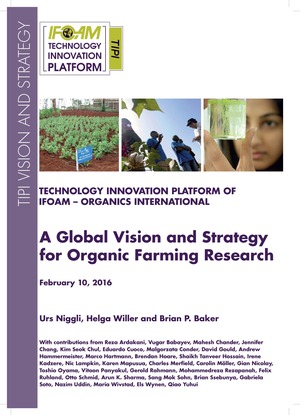Global Vision and Strategy for Organic Farming Research

The Technology Innovation Platform of IFOAM (TIPI) has developed a vision and strategy for organic farming research to advance organic agriculture through research, development, innovation and technology transfer. TIPI's vision and strategy was finalized in February 2016.
TIPI’s vision recognizes that current technologies based on heavy use of external inputs that are toxic, pollute the environment and are very energy-intensive come at a price. Investments in ecosystem services and the development of technologies that are productive, stable, adaptable, resilient, and fairly shared are much more likely to sustain the world’s population in a rapidly changing environment. Sustainable pathways to innovation will require engagement of all stakeholders in a science-driven multi-disciplinary approach.
Such an approach seeks to
- Empower rural areas,
- Provide eco-functional intensification that produces food, while harnessing and re-generating eco-system services as well as strengthening resilience to climate change, and
- Provide food for the health and well-being available to all.
- Organic agriculture must build the capacity to fulfill the world’s quantitatively, qualitatively and structurally adequate food needs for the entire population if it is to fulfill its mission.
The new paradigm proposed by TIPI is founded upon a holistic systemic approach, the engagement of farmers, researchers and other practitioners in a co-innovative approach; and open access technologies that are readily adaptable to local conditions. While there are barriers and bottlenecks that will need to be overcome for this vision to be realized, TIPI calls upon the organic community to support its 17 point action plan to advance organic agriculture in a forward-thinking and innovative way.
Global Vision and Strategy for Organic Farming Research: The process
- Based on a concept note, the first outline of the vision was prepared at the second Science day in February 2014, and
- the first draft of the TIPI Vision and Strategy for Organic Farming Research was elaborated in the course 2014 by experts from all parts of the world.
- This draft was discussed at the Workshop "Practitioners' Research Agenda" in October 2014 at the IFOAM Organic World Congress in Istanbul (see also: Summary of the discussion on the 1st Draft of the Research Vision of TIPI, the Technology Innovation Platform of IFOAM of February 2015).
- A consultation among TIPI members took place between October 2014 and January 2015.
- Final discussions took place at Science Day 2015. (See Report of the discussions on the TIPI vision and strategy at Science Day in February 2015).
- TIPI's vision and strategy was finalized in February 2016 and presented at Science Day 2016, at BIOFACH
- In 2017, a condensed version was published as well as the paper Building a global platform for organic farming research, innovation and technology transfer, which appeared in Organic Agriculture.
TIPI’s vision recognizes that current technologies based on heavy use of external inputs that are toxic, pollute the environment and are very energy-intensive come at a price. Investments in ecosystem services and the development of technologies that are productive, stable, adaptable, resilient, and fairly shared are much more likely to sustain the world’s population in a rapidly changing environment. Sustainable pathways to innovation will require engagement of all stakeholders in a science-driven multi-disciplinary approach.
Such an approach seeks to
- Empower rural areas,
- Provide eco-functional intensification that produces food, while harnessing and re-generating eco-system services as well as strengthening resilience to climate change, and
- Provide food for the health and well-being available to all.
Organic agriculture must build the capacity to fulfill the world’s quantitatively, qualitatively and structurally adequate food needs for the entire population if it is to fulfill its mission.
The new paradigm proposed by TIPI is founded upon a holistic systemic approach, the engagement of farmers, researchers and other practitioners in a co-innovative approach; and open access technologies that are readily adaptable to local conditions. While there are barriers and bottlenecks that will need to be overcome for this vision to be realized, TIPI calls upon the organic community to support its 17 point action plan to advance organic agriculture in a forward-thinking and innovative way.
Contact
Helga Willer, FiBL
 tap and then scroll down to the Add to Home Screen command.
tap and then scroll down to the Add to Home Screen command.